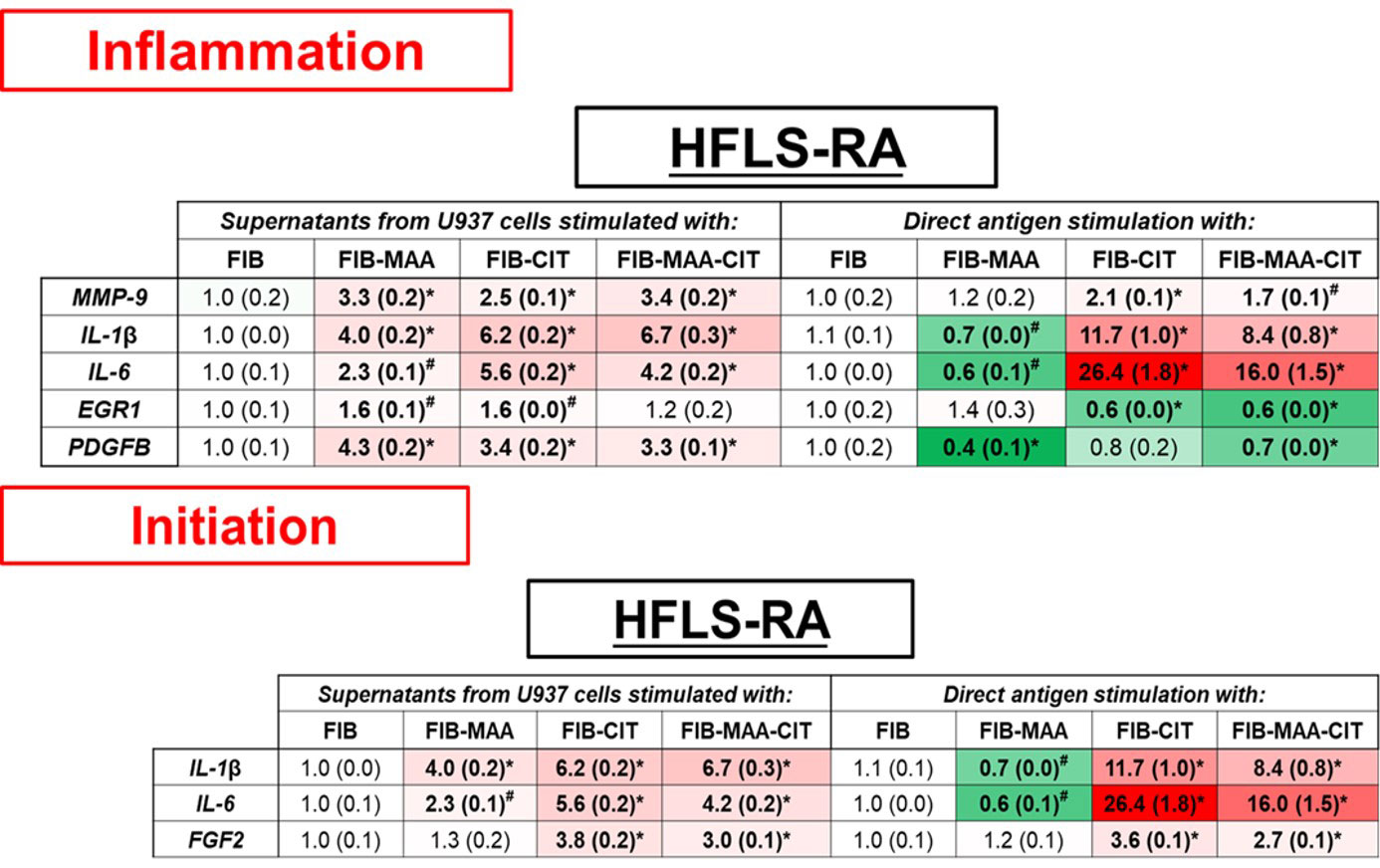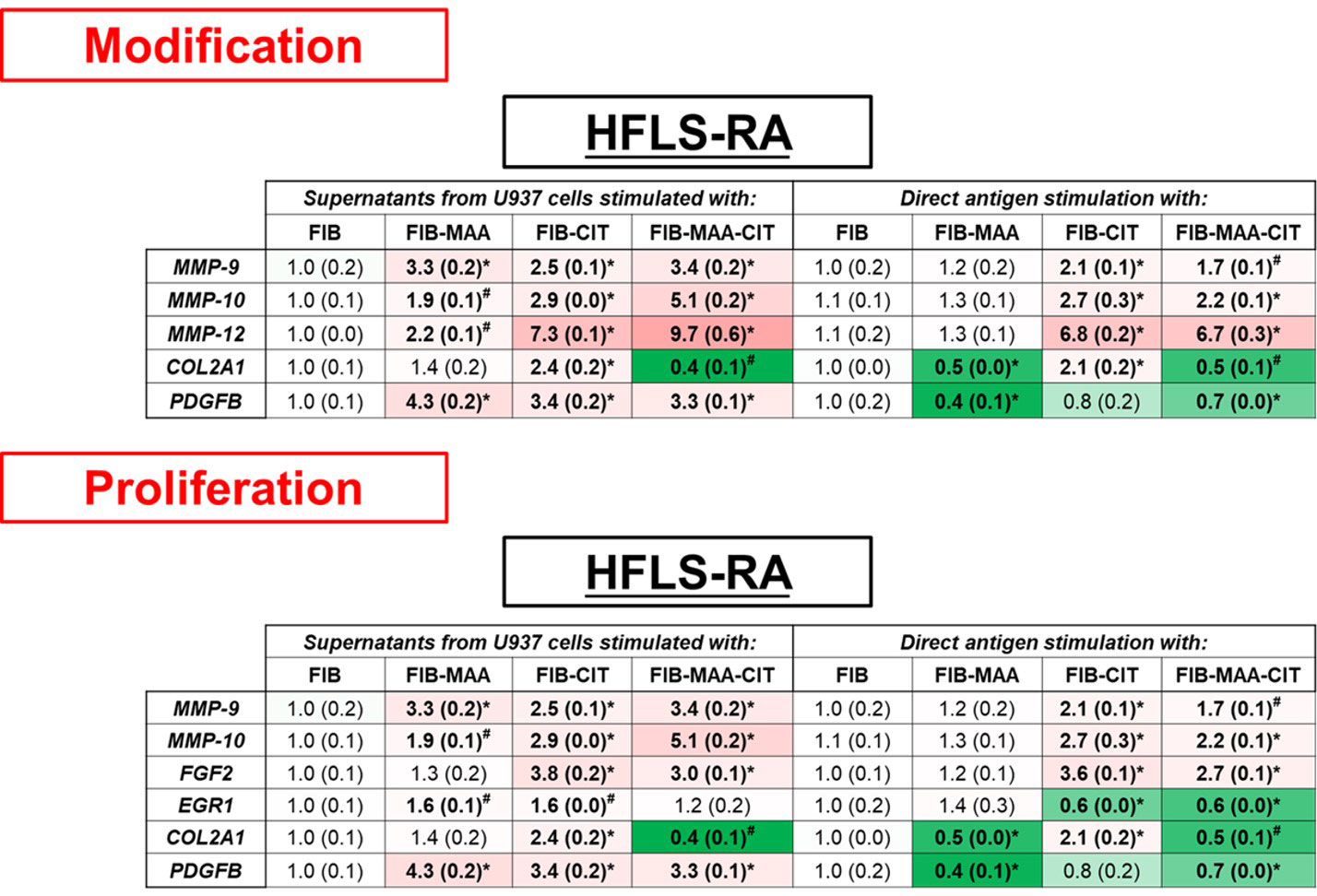Session Information
Session Type: Poster Session B
Session Time: 9:00AM-10:30AM
Background/Purpose: Cellular interactions between synovial macrophages and human fibroblast-like synoviocytes (HFLS) contribute to articular inflammation and fibrosis in rheumatoid arthritis (RA), leading to subsequent joint destruction. We have previously shown that malondialdehyde-acetaldehyde (MAA) and citrulline (CIT) modified antigens co-localize in RA synovial tissues. However, the mechanisms by which MAA and CIT modified proteins affect cellular interactions between macrophages and fibroblasts have not been well delineated. The purpose of this study was to identify fibrotic gene expression by HFLS-RA cells in response to: 1) Direct stimulation with MAA and/or CIT modified fibrinogen (FIB); or, 2) Indirect stimulation using secreted soluble factors from macrophages stimulated with MAA and/or CIT modified FIB.
Methods: In a previous study of HFLS-RA cells, the expression of 763 genes using the NanoString® Human Fibrosis Panel was evaluated and top 9 genes expressed were used for further evaluation (Maloley P et.al, 2021). In this study, HFLS-RA cell line was treated with either MAA and/or CIT modified FIB or with supernatants from human macrophage (U-937 cells) that had been collected after stimulation with modified FIB. RNA was isolated 8 hours post-treatment to determine the mRNA levels using RT-PCR. Genes were categorized into four groups (inflammation, initiation, modification, and proliferation) based on their role in the fibrotic pathway, with several genes exerting influence on multiple pathways. The mean of the relative quantity (Rq) of expression for each gene was reported. All the values were compared to the stimulation with native FIB.
Results: Direct antigen stimulation of HFLS-RA with FIB-CIT demonstrated an amplification of inflammation and initiation genes (Fig.1); MMP-9 (2-fold, p< 0.001 vs. FIB), IL-1β (12-fold, p< 0.001), IL-6 (26-fold, p< 0.001), and FGF2 (4-fold, p< 0.001). HFLS-RA treated with FIB-MAA-CIT amplified the same genes as FIB-CIT, but to a lesser extent. Direct stimulation of HFLS-RA with FIB-MAA significantly decreased IL-1β and IL-6 gene expression (Fig.1). In contrast, exposure of HFLS-RA to macrophage supernatants generated from stimulation with FIB-CIT or FIB-MAA-CIT led to increased expression of modification and proliferation genes; MMP-9, MMP-10, MMP-12, FGF2, EGR1, and PDGFB (Fig.2). When HFLS-RA were treated with U937 supernatants from FIB-MAA stimulated macrophages, MMP-9, IL-1β, IL-6, EGR1, PDGFB, and MMP-10, MMP-12 genes were increased compared to native FIB.
Conclusion: Our studies demonstrate that HFLS-RA cells exposed to MAA and/or CIT modified FIB primarily upregulated markers of inflammation and initiation. However, treatment with macrophage supernatants generated following stimulation with the same modified antigens shifted fibroblast gene expression towards modification and proliferation. These studies showed clearly differentiated responses that both direct antigen stimulation and macrophage interactions are necessary to engage all 4 relevant pathways involved in fibroblast-mediated joint damage that characterizes RA.
To cite this abstract in AMA style:
Aripova n, Duryee M, hunter c, Daubach E, Ryan E, Thiele G, Mikuls T. Post-translationally Modified Fibrinogen Activated Macrophages Drive the Expression of Fibrotic Genes in Rheumatoid Arthritis Fibroblast-Like Synoviocytes [abstract]. Arthritis Rheumatol. 2022; 74 (suppl 9). https://acrabstracts.org/abstract/post-translationally-modified-fibrinogen-activated-macrophages-drive-the-expression-of-fibrotic-genes-in-rheumatoid-arthritis-fibroblast-like-synoviocytes/. Accessed .« Back to ACR Convergence 2022
ACR Meeting Abstracts - https://acrabstracts.org/abstract/post-translationally-modified-fibrinogen-activated-macrophages-drive-the-expression-of-fibrotic-genes-in-rheumatoid-arthritis-fibroblast-like-synoviocytes/


